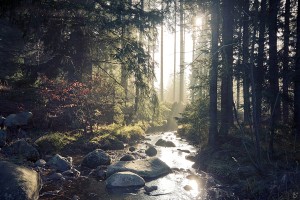
Moving Water
When you do things from your soul, you feel a river
moving in you, a joy.
When actions come from another section, the feeling
disappears. Don’t let others lead you.
They may be blind or, worse, vultures.
Reach for the rope of God.
And what is that? Putting aside self-will.
Because of willfulness people sit in jail, the trapped bird’s wings are tied,
fish sizzle in the skillet.
The anger of police is willfulness. You’ve seen a magistrate
inflict visible punishment.
Now see the invisible. If you could leave your selfishness, you
would see how you’ve been torturing your soul.
We are born, and live inside black water in a well.
How could we know what an open field of sunlight is? Don’t
insist on going where you think you want to go.
Ask the way to the spring.
Your living pieces will form a harmony.
There is a moving palace that floats in the air
with balconies and clear water flowing through,
infinity everywhere, yet contained
under a single tent.
Rumi. “Moving Water.” Poem.org. Steven Boyd, June-July 2005. Web. 30 Oct. 2016.
In many of Rumi’s famous poems one can find a great wealth of righteous knowledge that not only intends to give purpose to his poetic literature but to also give practical, beneficial advice to its readers. Collectively this piece describes two interconnected aspects of beauty that are found within human essence and likewise the absence of these characteristics causes individuals of a society to deviate from their pure human nature. The path of true righteousness is found when one submits themselves to the divine Creator in which they are retracing their body and soul to the initial instructions of God that had been placed upon the human being. This inevitably instills one with the ability to accept their own faults whilst simultaneously becoming obedient to religious law. These aspects are what Rumi defines as properties that successful, righteous individuals possess and therefore they are better enabled into rediscovering the true path of guidance as shown by God. Although the message presented is one of great virtue it is not yet complete as it entails that servants of the Most-Merciful will receive a reward for their sacrifices. Specifically they will be given spiritual ecstasy that will flow through their hearts in which will fill them with unexplainable happiness in this physical world and in the afterlife they will inhabit an unimaginable paradise. Alongside paradise the equivalent opposite, which is also known as hell, is a place of constant torment and punishment. The individuals who continue to linger in evil and cause their hearts to dwell in darkened, murky water will face a visible punishment in this materialistic world and also a physical consequence for their actions after death. Continuous balance of both reward and pain in this poem are parallel to that of the characteristics of good and evil. This entails that either result is with certainty present but it is not a fixed destination; therefore, an individual’s free will in the worldly life can in actuality change the outcome of their fate after death.
Rumi describes a general yet large understanding of the Islamic belief of the afterlife and it is by doing so that he impacts the reader into begin thinking for themselves. This is because he causing individuals to question the world around them in order to allow them to acknowledge the truth of this world: human beings are meant to be subservient to the Creator. If one is to become successful they must be willing to stand firm to their belief systems and must overcome the pressures that surround their social environment.
